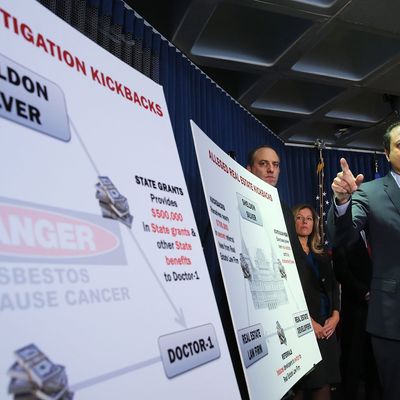
Preet Bharara is a bit of a prig. The trait is highly familiar in big-time New York prosecutors: Rudy Giuliani and Eliot Spitzer possessed it in spades. And it’s an indispensable quality in white-collar cops — the political and financial systems need upright enforcers of the rules to keep the most roguish operators from straying too far outside the lines, and to protect the citizenry that can’t afford to buy insider connections.
Yet moral rectitude isn’t always pretty, and the current U.S. Attorney’s righteous attitude was on full display yesterday during the press conference where he explained the charges leading to the arrest of State Assembly Speaker Sheldon Silver.
Bharara is ferociously, inspiringly smart. And he has a sense of humor. But it tends toward the condescending. Asked to explain what it meant that nearly $4 million of Silver’s money had been frozen, Bharara answered with practiced sarcasm: “It’s … frozen.” Asked to explain the distinction between a complaint (which had been issued against Silver) and an indictment (which hasn’t), Bharara responded as if he were addressing a roomful of particularly dense children (okay, he was addressing a roomful of reporters, so maybe he wasn’t too far off).
More telling, however, was Bharara’s mini-lecture when asked about the culture of crooked deal-making in Albany. “It’s very rare that you have a written agreement where someone says, ‘I’ll pay you this bribe and then you do this favor for me.’ There are a lot of people who are not so bright in office, but there are few who are that silly and stupid.”
Silver may well be a thief and a sleaze. If he pocketed millions of dollars in undisclosed payments in exchange for tailoring state laws to the needs of specific benefactors, then throw the book at him. Bharara, though, seems motivated by more than his duty to uphold the laws as they exist. He also seems driven by a desire to reshape the game of politics into how he thinks it ought to be played.
One of the accusations against Silver is that he, in Bharara’s term, “monetized” his public office for private gain by steering clients to Weitz & Luxenberg, the law firm that has long paid Silver a salary to be mysteriously “of counsel.” Part of the arrangement, according to the charges, was that Silver funneled $500,000 in state grant money to a doctor who then directed patients to Weitz & Luxenberg.
But at the risk of sounding hopelessly naïve, maybe that grant was one of many Silver dispensed, on the merits, for worthwhile medical research. And the other part of the equation, Silver’s employment as a “rainmaker,” is a function that can be grubby, is definitely common, and is not necessarily illegal.
When I asked Bharara yesterday how he will counter an argument that Silver’s lawyers are likely to make — that referring clients counts as “work” in a law firm — he answered, “Show up in court and you’ll find out.” It’s understandable he doesn’t want to show his cards this far in advance of any trial. But it was a surprisingly dodgy answer for someone who claims to have such a strong case.
The line between influence peddling and constituent service is uncomfortably fuzzy. And that line needs to be clearer and more strictly patrolled, especially since the story of greed in Albany went from William Kennedy–colorful to Pedro Espada Jr.–outrageous a long time ago. But the practice of politics is never going to be as black and white as the good-government types would like it to be.
Back in May, 2014, after Governor Andrew Cuomo unplugged the Moreland Commission and Bharara reacted with indignation and subpoenas, I wrote that the two men were engaged in a long-distance argument about what’s fair in politics. That’s still true. Though with yesterday’s arrest of Silver, the confrontation between Cuomo and Bharara, between a master of the sausage-making factory and a true believer in the humane treatment of swine, is getting a whole lot closer.





























